

TCU Biology Department. Dr. Brad Swanson Dept. of Biology Central Michigan University. Lori Eggert lab - Lori Eggert. Assistant Professor, Division of Biological Sciences University of Missouri-Columbia Division of Biological Sciences 226 Tucker Hall University of Missouri Columbia, MO 65211 e-mail: Lori Eggert Education University of California, San Diego.
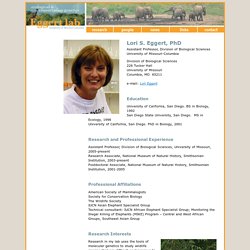
BS in Biology, 1992 San Diego State University, San Diego. Wayne Getz's Group - UC Berkeley ESPM - People. Mailing address:

MS Assistantships in Bat Ecology, Conservation, and Management. Position Description: MS research assistantships available for two projects studying bat ecology and management in Great Smoky Mountains National Park (GRSM), Tennessee.
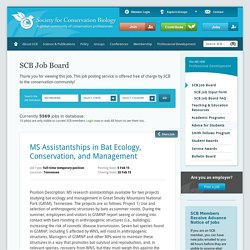
The projects are as follows: Project 1) Use and selection of anthropogenic structures by bats as summer roosts. During the summer, employees and visitors to GSMNP report seeing or coming into contact with bats roosting in anthropogenic structures (i.e., buildings), increasing the risk of zoonotic disease transmission. Home. Biological Sciences. John G.
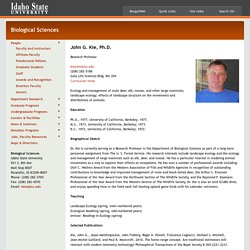
Kie, Ph.D. Research Professor Ecology and management of mule deer, elk, moose, and other large mammals; landscape ecology; effects of landscape structure on the movements and distributions of animals. Education Ph.D., 1977, University of California, Berkeley; 1977. Biographical Sketch. Biological Sciences. About Us The Department of Biological Sciences contributes to the mission of ISU with an emphasis on: advancing scholarly endeavors through discovery and the creation of new knowledge, foundational biological education for the health professions, providing a diverse array of courses and majors for students in the life sciences, and educator preparation.
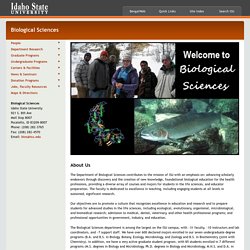
The faculty is dedicated to excellence in teaching, including engaging students at all levels in sustained, significant research. Our objectives are to promote a culture that recognizes excellence in education and research and to prepare students for advanced studies in the life sciences, including ecological, evolutionary, organismal, microbiological, and biomedical research; admission to medical, dental, veterinary, and other health professional programs; and professional opportunities in government, industry, and education. Sarah Benson-Amram - Research. General Interests I am interested in understanding the evolution of complex cognitive abilities in animals, in investigating what animals know about their social and ecological environments, and in asking how animals use this knowledge and their ability to learn about their environments in adaptive ways.
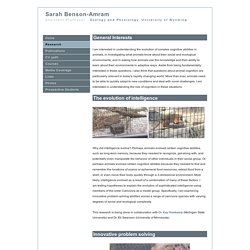
Aside from being fundamentally interested in these questions, I also think that questions about animal cognition are particularly relevant in today's rapidly changing world. More than ever, animals need to be able to quickly adapt to new conditions and deal with novel challenges. Reptile and amphibian conservation. Reptile and Amphibian Conservation Biology Thomas P.
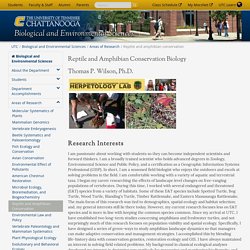
Wilson, Ph.D. Research Interests I am passionate about working with students so they can become independent scientists and forward thinkers. I am a broadly trained scientist who holds advanced degrees in Zoology, Environmental Science and Public Policy, and a certification as a Geographic Information Systems Professional (GISP). Researchers use solar power to study wild elephants in Africa. By Mark Shwartz Peter Zielyk, Flipside Creative A team of elephant researchers from Stanford University has transformed a remote corner of southern Africa into a high-tech field camp run entirely on sunlight.

A team of elephant researchers from Stanford University has transformed a remote corner of southern Africa into a high-tech field camp run entirely on sunlight. 11 » As elephants go, so go the trees: Research shows hunting can have catastrophic effects on tropical forests » University of Florida. GAINESVILLE, Fla. --- Overhunting has been disastrous for elephants, but their forest habitats have also been caught in the crossfire.
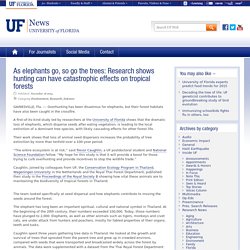
A first-of-its-kind study led by researchers at the University of Florida shows that the dramatic loss of elephants, which disperse seeds after eating vegetation, is leading to the local extinction of a dominant tree species, with likely cascading effects for other forest life. Their work shows that loss of animal seed dispersers increases the probability of tree extinction by more than tenfold over a 100-year period. “The entire ecosystem is at risk,” said Trevor Caughlin, a UF postdoctoral student and National Science Foundation fellow. “My hope for this study is that it will provide a boost for those trying to curb overhunting and provide incentives to stop the wildlife trade.” The team looked specifically at seed dispersal and how elephants contribute to moving the seeds around the forest. Caughlin spent three years gathering tree data in Thailand. Effects of poaching on African elephants.
The gruesome reality of poaching.Photo by Karl Ammann Poaching caused a decline of African elephants from 1.3 million to 600,000 individuals between 1979-1987.
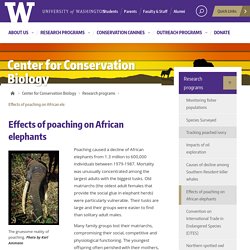
Mortality was unusually concentrated among the largest adults with the biggest tusks. Old matriarchs (the oldest adult females that provide the social glue in elephant herds) were particularly vulnerable. Their tusks are large and their groups were easier to find than solitary adult males. Many family groups lost their matriarchs, compromising their social, competitive and physiological functioning. Objectives We examined long-term impacts of poaching on elephants of the Mikumi-Selous Ecosystem, Tanzania—one of the largest and most heavily poached elephant populations on the continent prior to the 1989 ivory ban. Methods. State University Libraries : About. Formerly known as the Elephant Research Foundation LibraryA Web Site Dedicated to Elephant Research, Study and Enjoyment The Jeheskel (Hezy) Shoshani Library Endowed Collection (formerly known as the Elephant Research Foundation Library, or ERFL) is a diverse collection of information and display resources about elephants and their relatives both past and present and can be searched in the WSULS Online Catalog.
The collection is housed in the Purdy Library, patrons can apply for access at one of the service desks. Requests for interlibrary loan will be honored whenever possible. About ERF Founder Jeheskel (Hezy) Shoshani Hezy became interested in elephants after reading "Burma Boy" by Willis Lindquist. Kay E. Holekamp Laboratory - Welcome! Cary Institute of Ecosystem Studies. Biology at Bard College. Program links quick links Faculty and Staff Felicia Keesing David and Rosalie Rose Distinguished Professor of Science, Mathematics, and Computing; Director, Biology Program Contact: Office: Reem-Kayden Center 211 Phone: 845-752-2331 E-mail: keesing@bard.edu Website: click here to download file Back to top. Loren Hayes. I am an Assistant Professor in the Department of Biological and Environmental Sciences at the University of Tennessee at Chattanooga. I am also an Associate Researcher at P.
Graduate Program Zoology & Physiology. Step 1: Identify a faculty member in the Department of Zoology & Physiology whose research interests are similar to yours. A listing of faculty and their research areas is available through the Department of Zoology and Physiology web page. Contact the appropriate faculty member(s) and find someone interested in potentially serving as your graduate advisor. Step 2: After you have found a potential advisor(s), email a completed departmental application form, a copy of your curriculum vitae, copies of college transcripts and GRE scores to them. Research. The faculty, staff, and students of the Department of Wildlife and Fisheries Sciences value scholarship in all its forms – discovery, integration, application, and teaching. We value understanding for its ow. Page 9 essays. Peace Corps Master’s International Program. Going to graduate school and pursuing service opportunities isn’t an either/or proposition.
In the Peace Corps Master’s International (MI) program at Texas A&M University, you can combine Peace Corps service with a master’s degree. Studying abroad with the MI program can be a life-changing experience, both personally and intellectually. You’ll gain academic enrichment, improved foreign language skills, a better understanding of other cultures, and more marketable skills for your future job search. Download the informational flyer (PDF) How It Works In the MI program, you’ll work with your faculty advisor and committee, as well as the MI program coordinator, to plan a degree program that fulfills your career objectives and degree requirements while preparing for your Peace Corps service. How to Get Started To become a part of the Peace Corps Master’s International program at Texas A&M University, complete the following steps: Include the following materials with your application:
College of Agriculture and Life Sciences. Texas A&M University - College Station — College of Agriculture and Life Sciences. Program Type: Master's International. Colorado State University - Ft. Collins — College of Agricultural Sciences. Program Type: Master's International. The Berger Lab. The Berger Lab. Gradschool. People - Wittemyer Lab. Wittemyer Lab. George Wittemyer Assistant Professor. eeb.tamu.edu/files/2013/11/ecoexist_dec13.pdf. eeb.tamu.edu/files/2013/11/ecoexist_dec13.pdf. Berger Lab. Publications (a splattering across disciplines) Books. Gradschool. snre.arizona.edu/sites/snre.arizona.edu/files/WFSC%20requirements.pdf. "" Results - "0" Graduate Schools and Graduate Programs found for ""